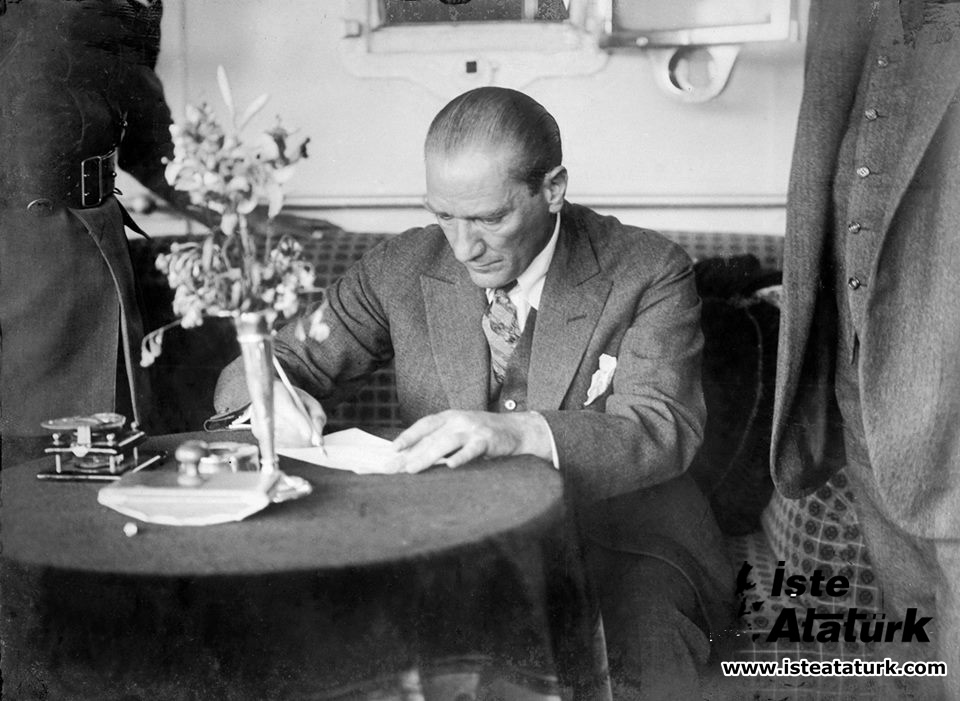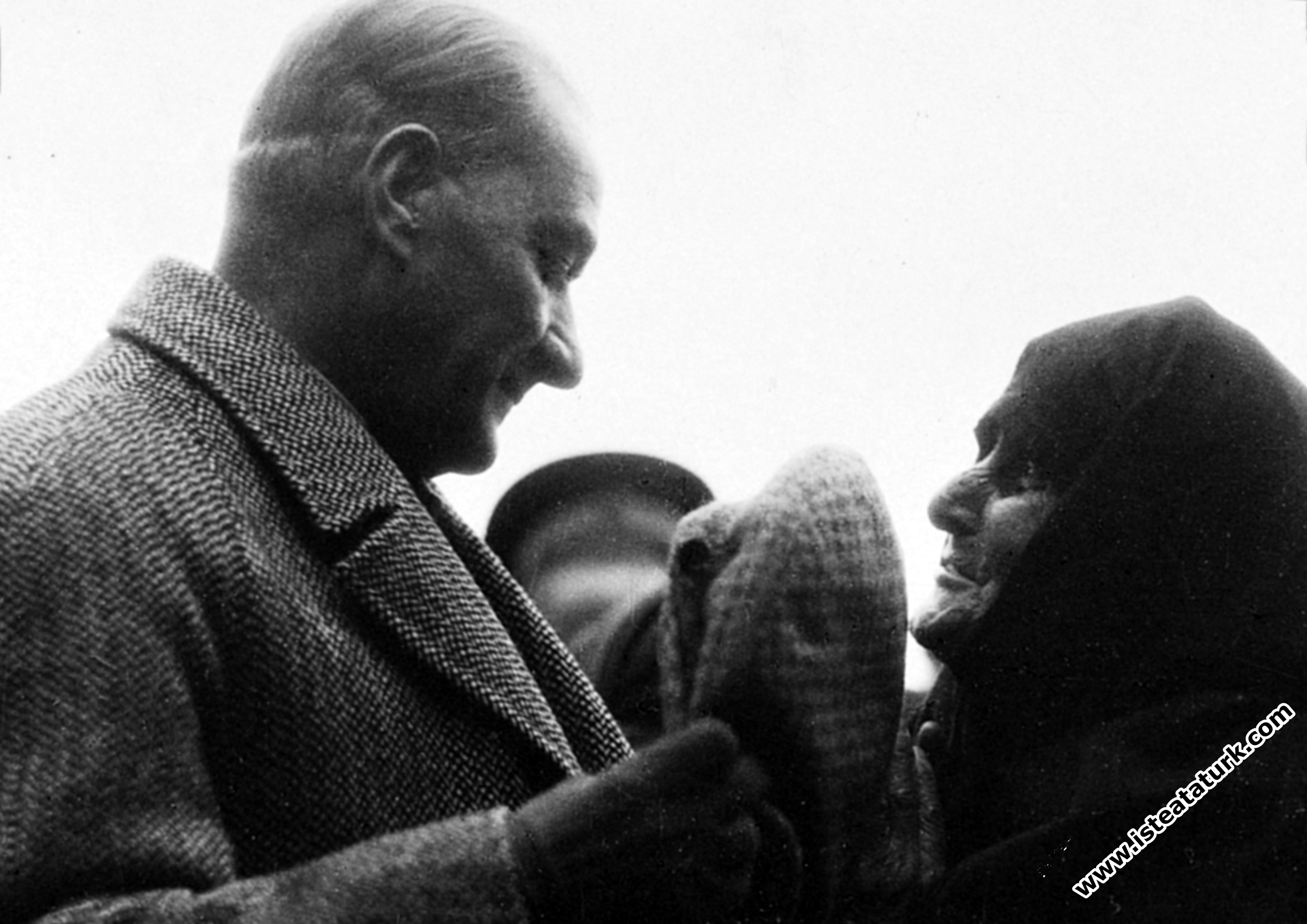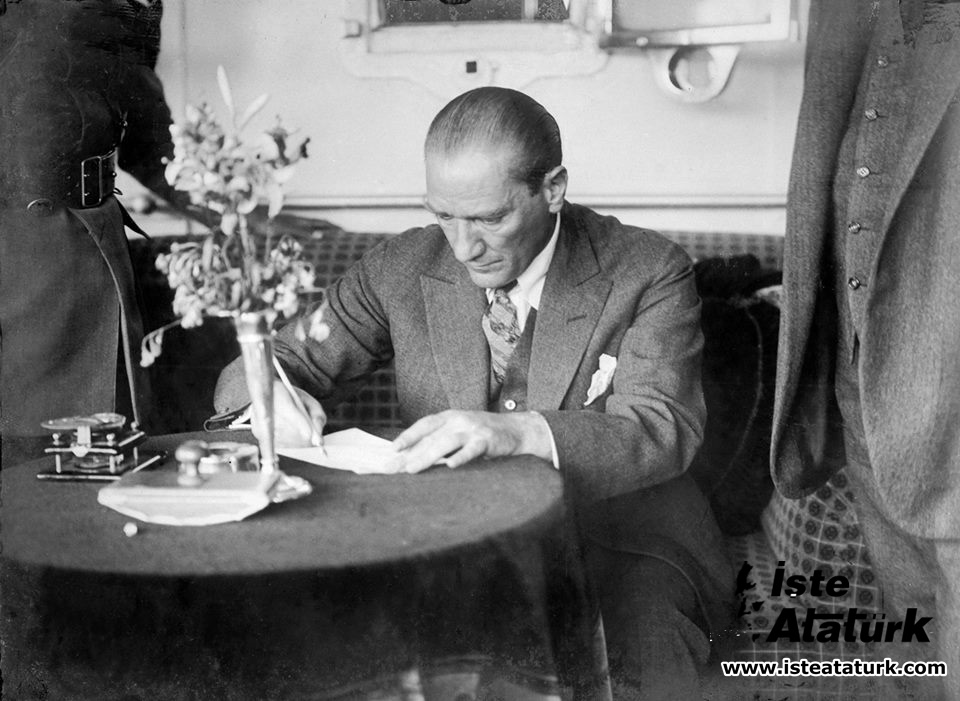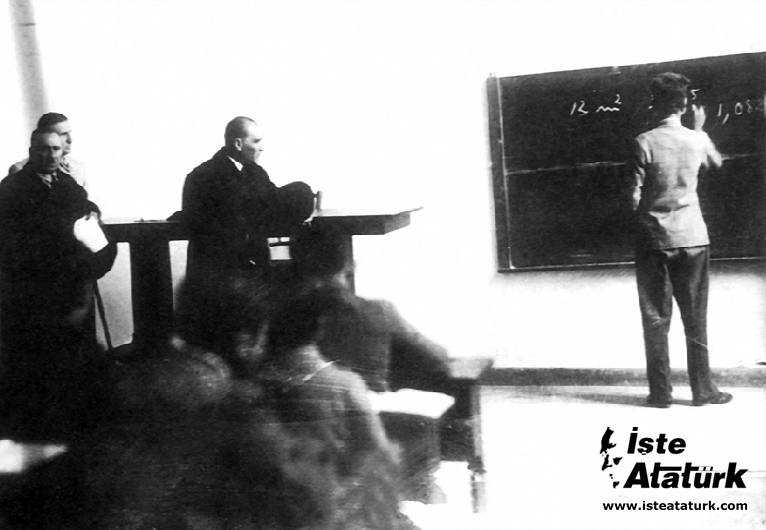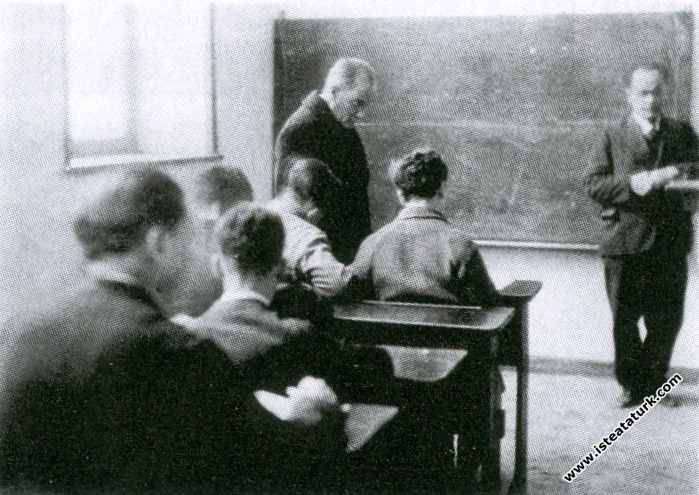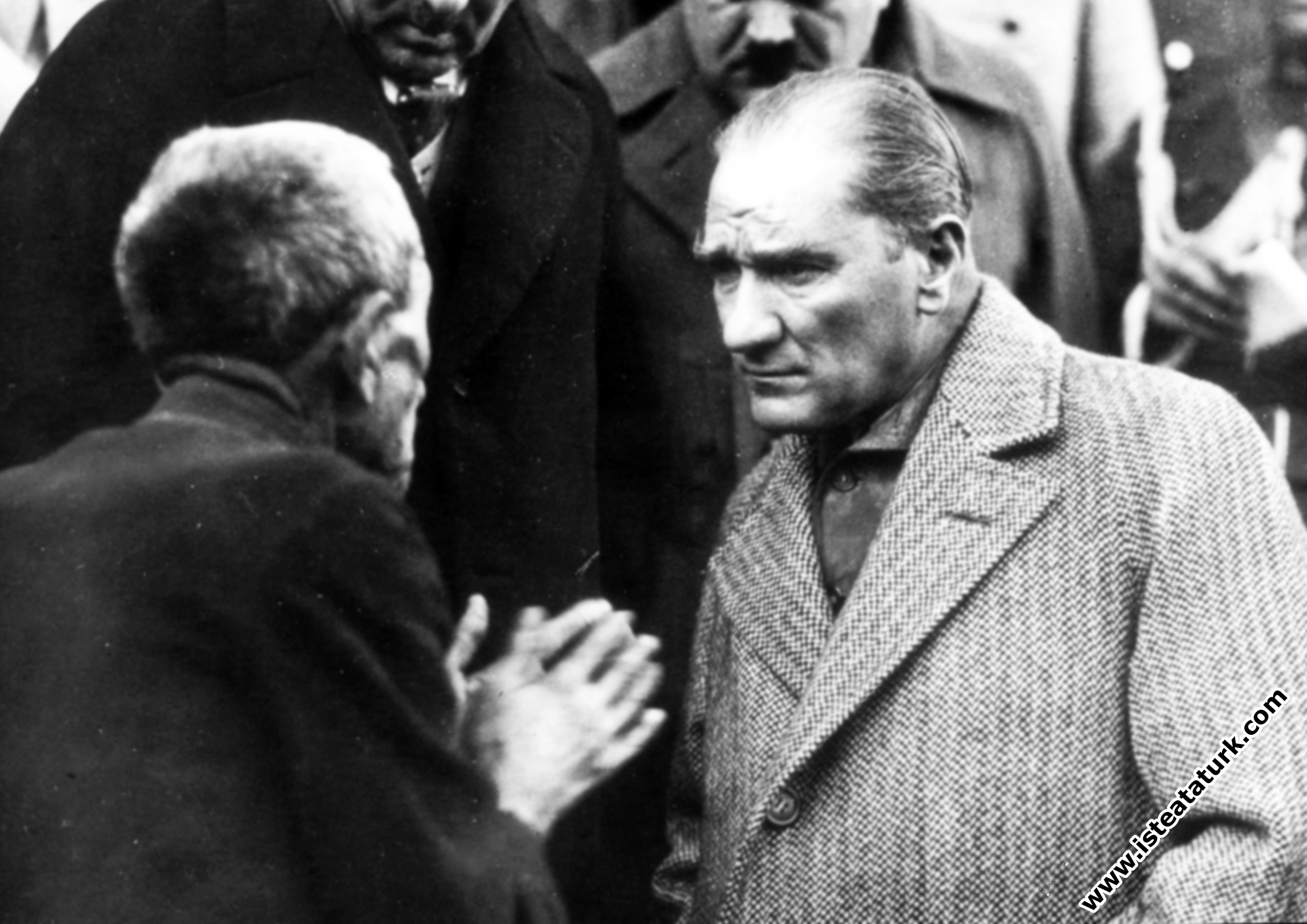
Atatürk and Peace
Character Size
"A direction of peace that aims at the security of Turkey and is not against any nation will be our motto" Mustafa Kemal Atatürk
ATATÜRK and PEACE
Part 1
In the resolution adopted by the UNESCO General Conference on November 27, 1978, on the occasion of Atatürk's 100th Anniversary, Atatürk stated that “Atatürk's works for the establishment of mutual understanding and lasting peace among the nations of the world set an extraordinary example and that his actions have always been peace and international understanding. and in terms of respect for human rights, it was very appropriate. Because Atatürk is not only a great and victorious commander, but also a great statesman who is the follower of a very successful peaceful policy. On the other hand, we see that the United Nations General Assembly declared the year 1986 (World Year of Peace).
One of the principles that characterize Kemalism is "Peace at Home, Peace in the World". type. Because he saw the precondition of "reaching the level of modern civilization", which he showed as the main goal for the Turkish nation, in peace at home and in the world. Because he knew very well that the reorganizations that had been planned in the Ottoman Empire since the reigns of Selim III and Mahmut II; He could not achieve success with events such as internal conflicts, riots, street fights. We see that Atatürk put forward the principle including “Peace in the World” in 1931, at a time when world peace in Europe was clearly in danger. Aiming to reach the level of modern civilization as a nation, Atatürk knew the negative effects of a disrupted world peace on Turkey's modernization and modernization breakthrough, and he considered it necessary for the continuation of world peace in order for the Turkish nation to complete its deficiencies in a short time.
It was also clear that Turkey, which is in the most sensitive and critical place in the world, could easily be involved in a conflict that could arise on a world scale. For this reason, Atatürk has followed a policy that will contribute to the formation of world peace from the beginning of the national struggle.
Atatürk, who was also a realist and pragmatist in foreign policy, adopted the principles of establishing a national state and following a foreign policy required by international realities as the basic principles of Turkish foreign policy at the beginning of the national struggle. Since Turkey's geopolitical situation was on the path to the expansion and national interests of great and powerful states, it was imperative that our foreign policy be adjusted according to the development of international relations.
We see that Atatürk emphasized the importance he gave to world peace in many of his speeches. As a matter of fact, in his speech at the Turkish Grand National Assembly on November 1, 1925,
“Mutual trust and well-being is a principle of happiness on which all nations of the world should tremble. However, unless this principle is realized for all nations, it would be appropriate to see some powerful nations gaining new behavior and privileges against some nations that are wanted to be exploited, rather than providing a general reconciliation. Taking measures to ensure that the international arms exchange is kept under the control of certain nations increases this suspicion”. In another speech, Atatürk said, “Peace is the best way that leads nations to prosperity and happiness. Strengthening our country every day, keeping it in a position to withstand all kinds of possibilities, and watching all phases of world events with great vigilance is the beginning of the principles on which our peace-loving policy will be based .
Atatürk, who loves peace and wants to preserve it until the end, is not in favor of peace at any cost. As a matter of fact, in a speech he made in 1923, “Behemehal, I am not in favor of dragging the nation into war for one reason or another. War must be essential and vital. My real opinion is this: When we take the nation to war, I should not feel pain in my conscience, we should go to war against those who say "we will kill", saying "we will not die".
In 1928, he said the following on this subject: “There is no circumstance that can be explained more easily than that a country, which is in fundamental reform and development, seriously desires peace and tranquility both for itself and for its surroundings. In our foreign policy inspired by this sincere desire, our ability to defend the country's inviolability, security and citizens' rights against any encroachment is a point that we particularly like.
Atatürk favors the peaceful resolution of conflicts. In 1929 he says: “Seeking to settle any of our international problems by means of peace is a way that suits our interests and thoughts. In order not to be faced with an offer other than this way, we attach importance to the security principle and its tools” . in 1931; He said , "Our motto will be a direction of peace that aims at Turkey's security and is not to the detriment of any nation . "
This foreign policy increased Turkey's reputation in the outside world and was instrumental in its entry into the League of Nations in 1932.
Chapter 2
Atatürk, after establishing internal peace, started to provide friends and allies starting from the neighbors, the leader who saw the unrest in Europe very well in the 1930s, the American journalist woman Gladys Baker and General Mac Arthur, by stating these unrest and where they could lead to and what they could bring to the world. He wanted to warn the rulers. We know that for the security of the regions close to Turkey, he created the Balkan Entente in 1934 and the Sadabat Pact in 1937.
Atatürk, a great soldier, is not a war man, but a man of peace. In a statement he gave to the correspondent of the “Daily Mail” newspaper in Izmir on September 26, 1922, after Izmir was liberated from the enemy occupation on September 9, 1922; “I truly want peace. I had no desire to make the final offensive. But I could not find any other way to expel the Greeks from Anatolia. The temperance we showed in the victory contradicts the destructiveness of the Greeks, and I trust that the British nation will now enter into trade and friendly relations with Turkey”. As a matter of fact, we know that friendship and even alliance relations were established with both the Greeks and the British at the first opportunity.
Atatürk In 1935, nations in the world are considered as residents of an apartment. He said that if an apartment is set on fire by some of its occupants, there is no way others can escape the effects of the fire.
Another statement of Atatürk that reveals his interest in world peace is the following words of Romanian Foreign Minister Victor Antonesco on 17 March 1937, on the occasion of his visit to Ankara : For this reason, it is necessary to consider all human beings as a body and a nation as its organ. All other organs are affected by the pain at the tip of the finger of a trunk. If there is such an ailment, we should deal with it as if it were among ourselves. No matter how remote the event may be, we should not deviate from this principle, it is this thinking that saves people, nations and governments from selfishness”.
The words of the far-sighted statesman Atatürk to General Mac Arthur, who came to visit him on September 28, 1932, at Dolmabahçe Palace, and which were later published in the General's memoirs, are the product of a profound intuition that reached the level of prophecy:
“... I think the fate of Europe tomorrow as well as yesterday will depend on the situation Germany will take. Having an extraordinary dynamism, this hardworking and disciplined nation of 70 million will sooner or later attempt to abolish the Versailles Treaty, as soon as it gets caught up in the political current that can stimulate its national ambitions”. In the same speech, Atatürk also spoke about Italy as follows: “I am afraid that today's leader of Italy (Mussolini) will not be able to free himself from his desire to play the role of Caesar and will immediately show that Italy is still far from creating a military force.”
Atatürk said that America will not be able to remain neutral in this war as it was in the last war, and that Germany will be defeated only because of America, and added the following to his words: “I am afraid that the disaster will not be averted unless the European statesmen deal with the important political issues, which are the main subject of disagreement, without any national selfishness and only in accordance with the general interest, with a final effort and full goodwill. Because the European issue is no longer a problem of disagreements between England, France and Germany. Today, a new force has emerged in eastern Europe that threatens all civilization and even humanity. This terrible force, which mobilizes all its material and spiritual resources for the purpose of world revolution, also applies brand new political methods that are not yet known to Europeans and Americans, and knows how to make the best use of even the smallest mistakes of its opponents. The main winner of a war in Europe will be neither England, nor France, nor Germany. It is just Bolshevism. We, the Turks, who are close neighbors of Russia and have fought the most with this country, are watching the events there closely and see the danger with all its nakedness. The Bolsheviks, who exploit the mentality of the awakened eastern nations, caress their national passions and know how to inflame their grudges, have become the main force threatening not only Europe but also Asia.”
It was later understood that if the whole world, and especially the US and British rulers, could understand Atatürk's view, humanity would not have experienced the Second World War and most of the painful developments that followed.
Chapter 3
One of the most frequently asked questions before September 12, 1980 was whether the Atatürkist foreign policy and the Pacts were compatible and how they would be reconciled with Atatürk's "Independence" principle.
It is possible to summarize the answers I gave to such questions, which are often based on purposeful and constant propaganda and suggestions made in the public, and sometimes based only on the curiosity of learning:
Independence cannot be taken to mean that no state renounces its right to make treaties required by its national interests. On the contrary, independence means that, based on the will of the independent state, it enters into all kinds of relations that the interests of a nation and state require, the important thing is that these initiatives are made on the basis of national authority, not by external coercion, and to be continued to the extent and as long as national interests require, and again only based on the free will of the state. If necessary, this relationship should be terminated.
The Balkan Entente, which mutually guaranteed the borders of these countries between Turkey, Greece, Romania and Yugoslavia, against the revisionist currents that emerged against the treaties signed at the end of the First World War in Europe, with the initiative of Atatürk himself, and on February 9, 1934. Don't we know that it was founded in ? Likewise, with the invasion of Abyssinia by Italy, against Mussolini's expansionist policy that emerged in the Eastern Mediterranean and the pre-constitution, again with Atatürk's initiative, on July 8, 1937, at the Sabadat Palace in Tehran, Turkey-Iran-Afghanistan It is still remembered that the treaty known as the “Sadabat Pact” was signed between Iraq and Turkey. Thus, Ataturk's Turkey,
Chapter 4
We know that Atatürk explained his military views and principles both in his Great Speech and in his speeches and statements at various times and places. The Great Commander did not approve of war and fighting unless it was necessary and vital. He considered war inevitable only in order not to die against those who wanted to kill him and to protect his freedom and independence.
As early as 1919 , “When the independence of the nation is in jeopardy, the nation assembles its armies and accepts only one course of action. He also said, “ To shed your blood to the end for salvation ”. Atatürk, who said , "There is no solution or solution other than to fight the enemy with our whole being for liberation and independence," also said the following about the reason for the war: "For this or that reason, I am not in favor of dragging the nation into war. War must be essential and vital. My true conviction is this: I should not feel any torment in my conscience when we take our nation to war.” We can go to war against those who say "We will kill", saying "We will not die". But when the nation's life is not in danger, war is murder."
Atatürk, in his speech in Dumlupınar on the Third Anniversary of the Great Victory on August 30, 1924, defined the war as follows:
“War, battle, especially pitched battle is not only the clash of two armies facing each other, it is the clash of nations. It is a testing ground where nations collide with all their assets, their levels in science and technology, their achievements, their morals, their cultures, their virtues, in short, with all their visible powers and assets, with all their means and possibilities. It means that the real strength and value of the nations fighting in this field will be measured. The result reveals the superiority of not only visible forces, but all forces, especially those that come from morality and culture. For this reason, the defeated party in the field battle is deemed to have been defeated and defeated by all its forces and assets, as a nation and country. You can imagine how dreadful such an outcome would be. Disintegration is not limited to the army at war alone. The nation that took out that army would have suffered this terrible result. Politicians who could not overcome their greed with the Crusaders in the beginning of history are full of such terrible results in the hands of invading nations and invading armies, who have become toys for some empty and unwarranted wishes.
We see that Atatürk defined the concept of "total war", which emerged in the world military literature during the Second World War, in the "Great Speech" he read in October 1927, as follows:
“You know that war and war mean that two nations not only come face to face with their two armies, but also come face to face with all their assets and all their material and spiritual forces and fight each other. For this reason, I had to concern the whole Turkish nation intellectually, emotionally and de facto as much as the army at the front. Members of the nation, not only those who were against the enemy, but also everyone in the village, in their house or in their fields, would put all their assets into the struggle, feeling like a combatant with a gun. Nations that are slow to devote all their material and spiritual assets to the defense of their homeland and ignore it are not considered to have taken war and war seriously and believed that they could succeed.
Atatürk, while opening the İzmir Economy Congress on February 17, 1923, said: “The nation was able to start work without a gun, cannon, vehicle or money, and establish one of the strongest armies in the world, and this army won the First İnönü, the Second İnönü and Sakarya Battles while it was still in formation. and finally destroyed the enemy armies that trampled our holy land until the end.”
Chapter 5
It is not possible for those who read the news and see the pictures about the war between Iran and Iraq, our eastern and southern neighbors, two friendly and brotherly countries, which destroyed each other not only militarily but also economically, not to remember the pacifism of the great Commander Mustafa Kemal Atatürk and his view describing non-essential wars as murder. there is none.
According to Mustafa Kemal, only when the freedom and independence of a nation is in danger, one can resort to arms. In an interview published in the newspaper "Hakimiyet-i Milliye" on April 22, 1921, regarding the first anniversary of the Turkish Grand National Assembly; “His Excellency, how did this idea of pure and noble resistance shown by the Turkish nation to the whole world first arise in your high personality?” Mustafa Kemal's answer to the question is as follows:
"Freedom and independence are my characteristics. I am a man created with the love of independence, the most precious legacy of my nation and great ancestors. This love of mine is known by those who know every period of my family, private and official life from my childhood to this day. In my opinion, the existence and permanence of honor, dignity, honor and humanity in a nation definitely depends on the independence and freedom of that nation... I must definitely be a member of an independent country in order to live. When the interests of the nation and country require it, I evaluate with great sensitivity the friendship and political relations that are a necessity of civilization with each of the nations that make up humanity. But I am also an irreconcilable enemy of any nation that wishes to enslave my nation, until it renounces this desire.”
Regarding the law envisaging him to be given the Commander-in-Chief on August 5, 1921, Mustafa Kemal says the following: “Sirs, my confidence and belief that we will definitively defeat the enemies who want to enslave our poor nation, with God's help, has not been shaken for a minute. At this moment, I declare this belief to your high delegation, to the whole nation, and to the whole world.”
Upon the victory of the Battle of Sakarya, on September 19, 1921, Commander-in-Chief Mustafa Kemal said in the Turkish Grand National Assembly: “We cannot give up our weapons until we achieve our rights. But do not think that we are excessively pro-war. There can be no greater injustice than such an understanding. On the contrary, we want to make peace with everyone. We have resorted to every means to get our rights through peace... We are not fighters, we are peacemakers. We would like to see the establishment of peace as soon as possible and help it... As the head of your Supreme Council, I must declare that we want peace, not war. We would like to see peace be established as soon as possible and help it... We are ready to make peace... It is impossible if it is thought that the Greek army will dissuade us from our rightful cause” .
Again, Atatürk said in the Turkish Grand National Assembly on April 18, 1922: “Friends, the armies that your supreme assembly managed to create with known difficulties are not actually one of the old Ottoman armies based on the Vienna walls. However, in terms of the high humane ideal it has, it is a piece of steel of superior quality and value. The army of the GNAT government is free from being an instrument of ambition in the hands of this or that to seize lands, or to destroy states, to establish a state”.
Upon the victory of the Great Victory on August 30, 1922, Mustafa Kemal made the following statement to the correspondent of the British newspaper “Daily Mail” in Izmir on September 26, 1922: “There is no reason to continue the war anymore. I truly want peace. I had no desire to make the final offensive. But I couldn't find any other way to drive the Greeks out of Anatolia... The moderation we showed in victory contradicts the destructiveness of the Greeks. I trust that the British nation will now enter into trade and friendly relations with Turkey”.
On October 4, 1922, Mustafa Kemal said from the pulpit of the Assembly: “... On the fifth day of August last year, when I was thanking you for appointing me the Commander-in-Chief, I said: 'We will drown the Greek army, which entered our country to trample on our country, in our sacred hearth'. I guess events proved it. Indeed, the Greek army has completely drowned in our holy land... Friends, our nation has achieved this success with its unwavering unity and effort as a single man. I have no doubt that our nation will complete this victory by showing the same help, effort and unity in peace affairs as well as in post-peace affairs. This victory gives us an opportunity, and we will use this opportunity for the bright, happy and prosperous future of our country and nation.”
Finally, Mustafa Kemal, while opening the Turkish Grand National Assembly on November 1, 1930, says: The aim of peace and good relations is sincerely pursued in our foreign policy. I hope that our clear and healthy attitude in international relations, which is truly committed to friendships and is not vis-a-vis any nation, is increasingly understood.
Prof. Dr. Ismet Giritli *
*Former Member of Atatürk Research Center Scientific Committee
Source: ATATÜRK ARAŞTIRMA MERKEZİ DERGİSİ, Sayı 6, Cilt: II, Temmuz 1986
